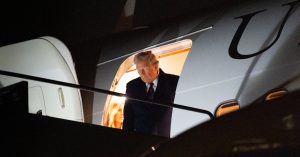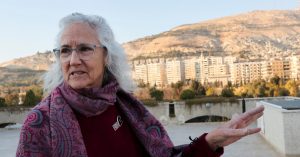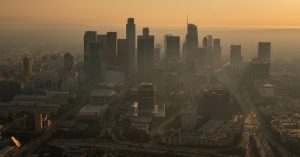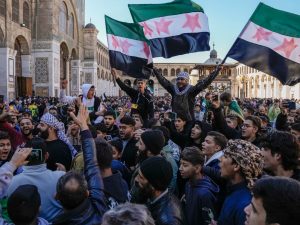
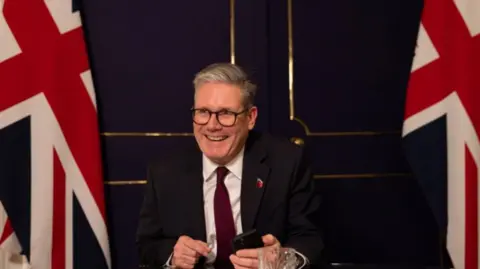 No 10 Downing Street
No 10 Downing StreetSir Keir Starmer will visit Washington for talks with Donald Trump within weeks, the foreign secretary has suggested.
Speaking ahead of Trump’s inauguration as president on Monday, David Lammy said the “strength” of the UK-US relationship meant he was “very confident” the PM would secure an early meeting.
There are several diplomatic challenges looming for the Labour government in its engagement with the new administration, including proposed trade tariffs and growing tensions over the UK’s proposed Chagos Islands deal.
The prime minister has said he believes the “special relationship between the United Kingdom and the United States will continue to flourish” under Trump.
Speaking to reporters, Lammy said: “I think that when you look at past prime ministers, it’s taken between a week or up to a month to come to Washington. The importance is the strength of the relationship and the serious discussions that we have.
“In the end, we have war in Europe, we have a ceasefire in the Middle East, but it’s incredibly fragile, and there are important malign actors like Iran that we’ve got to discuss with the United States and, of course, our growing trade relations with the United States.
“So, lots to discuss, and I’m very confident that Keir Starmer will be discussing this with Donald Trump within the next few weeks.”
Ahead of the inauguration, Sir Keir released a statement congratulating the incoming US president – saying the UK and US would “continue to build upon the unshakeable foundations of our historic alliance”.
The PM said they would tackle “global challenges” and “focus on shared opportunities ahead for growth”, adding the “special relationship between the United Kingdom and the United States will continue to flourish for years to come”.
Sir Keir and his team have been preparing for Trump’s presidency with increasing intensity for a long time, because of the importance of this bilateral relationship.
Before the US election, Sir Keir and Trump met in New York at Trump Tower as part of a charm offensive by Labour politicians with the new administration over the last year.
Sir Keir added: “I look forward to our next meeting as we continue our shared mission to ensure the peace, prosperity and security of our two great nations.”
Trump’s threat to impose tariffs and what his return to Washington could mean for US support for Ukraine could be among the first issues raised during his second term.
Ministers have been concentrating on policy given it’s unclear precisely what Trump will do, except that he comes at some big issues from a very different perspective to the UK.
He believes China is the west’s biggest strategic threat at a time when British ministers are trying to re-establish some ties with Beijing, and he loathes the European Union, with which the PM is trying to “reset” relations.
He may well impose significant tariffs on countries including the UK, which would have a huge impact on the British economy.
On the BBC’s Sunday with Laura Kuenssberg programme, Chief Secretary to the Treasury Darren Jones suggested the UK could dodge Trump’s pledge for a 20% tax on all imports into the US due to not being in a “trade deficit”, adding ministers have “prepared for all scenarios”.
He said the government “need to see what the Trump administration do” but also that Trump is “well known for wanting to do a good deal”.
The government is also hoping to avoid a diplomatic row over a proposed deal to hand over the Chagos Islands – where there is a joint US-UK military base – to Mauritius.
The deal, which has been greenlit by the Biden administration, is now on hold to allow the incoming Trump administration to review the details.
Marco Rubio, the incoming US Secretary of State, has called the deal a risk due to concerns that Mauritius’s links to China might compromise the safety of the American base on Diego Garcia.
Lammy told the BBC Radio 4’s Today programme he expects Trump to back the deal.
“It’s right and proper that the new administration is able to consider” the deal, Lammy said.
“But having gone through the deal in detail, it is the right deal to keep the global community safe.”
In a departure from tradition, Trump has invited several world leaders to his inauguration.
Dame Karen Pierce, the outgoing UK ambassador, will represent the government at Trump’s inauguration.
Labour have picked Lord Peter Mandelson, one of the best-known figures in British politics who served under Tony Blair and Gordon Brown, to be the next US ambassador. He is due to replace Dame Karen in the next few weeks.
Lord Mandelson’s nomination has caused some controversy in the US due to his past remarks calling Trump a “danger to the world” and “little short of a white nationalist”.
Conservative shadow foreign secretary Priti Patel has flown to Washington to attend a Republican-hosted event at the inauguration.
Speaking to the BBC she said there were “hopes for his [Trump’s] administration”.
“We need to continue to build upon that and at a time when our world is facing so many global challenges… we need to ensure that our strongest and closest ally is really in lock step with us,” she said, adding that meant reopening trade deal discussions.
Reform UK leader Nigel Farage said the government needs to “think outside the box” when dealing with the Trump administration.
Speaking to BBC Radio 4’s The Westminster Hour, Farage said: “I think what this government does, is what all governments do – they stick with the established, status quo methods of appointing people.
“This guy [Trump] does business differently to anybody else we’ve seen in global politics before.”
Farage, a long-time supporter of Trump, has previously offered to act as a go-between in negotiations with the president-elect but has so far been rejected by the government.
“They don’t think they need me – but they might find in short order that maybe they do,” he said.
Elsewhere, Liberal Democrats leader Sir Ed Davey said that Trump’s return to the White House would be “deeply worrying for millions of people in the UK and around the world.”
He said: “With a president who promises trade wars, undermines Nato and praises Vladimir Putin, the threats to our national security and our economy are clear.”



